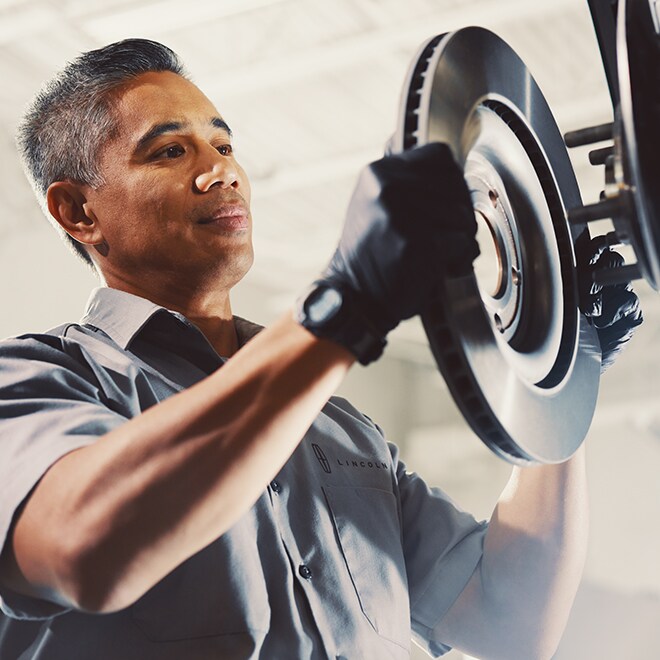Jim Burke Lincoln Brake Service
We Know Your Brakes Best
Ensuring the safety of drivers and passengers on Southern California roads is of utmost importance. A vehicle's braking system plays a crucial role in this regard. However, brake components wear out with time, reducing efficiency. Car owners must get their brakes inspected and serviced regularly to avoid mishaps.
Brake Offers

How can I tell if my brakes need servicing?
As they use their vehicle daily, most drivers get used to how their brakes feel when operating correctly. When something's not right, there are telltale signs that let the driver know they might need a brake repair. Faulty brakes can significantly reduce a vehicle's stopping distance, creating a hazard for the driver and others. Here are some signs to look for.
Squealing or Grinding Noises
Brake pads feature built-in wear indicators. These small metal tabs touch the rotor surface and make a squealing noise, letting the driver know it's time for new brake pads. If the squealing changes to a grinding noise, the pads may have worn away completely, causing the calipers to grind on the rotors. In this case, the car will probably need new rotors as well as pads.
The Vehicle Pulls to the Side
A car pulling to one side during braking may indicate uneven brake lining wear or brake fluid contamination. A professional technician should inspect the brakes as soon as possible.
Visual Signs
Drivers should inspect the brake pads and rotors occasionally for wear and damage. If the pads are less than a quarter inch thick, it's time to change them. Discolored rotors could indicate a problem that they should have checked out. A pool of brake fluid under the car means there's a leak that needs immediate repair.
Brake Pedal is Spongy or Vibrates
If a driver feels that the brake pedal is soft or must push it further down than usual to take effect, this could be a sign of air in the brake system, a hydraulic problem, or a fluid leak. When the brake pedal vibrates, it's usually a sign of warped or bent rotors.
These problems may only require replacing or repairing specific components if dealt with quickly. However, ignoring the signs may result in the car needing a complete brake replacement.

What Kinds of Brake Repair Do We Perform?
We can provide our customers with all their brake service and repair needs. A regular brake inspection will ensure the brakes work at their best.
During a brake inspection, our technician will:
- Check the level and condition of the brake fluid.
- Measure the thickness of the brake pads and check for even wear.
- Ensure there are no leaks in the brake lines or master and caliper cylinders.
- Inspect the thickness of the brake rotors and check for runouts or hot spots.
- Check the brake calipers for movement, wear, and fluid leaks.
- Test and make necessary adjustments to brake hardware.
- Check the anti-lock brake sensors.
- Check the parking brake for damage and correct operation.
If the technician finds a problem or potential problem, they can advise the customer on the correct remedy. We can change the brake fluid and pads as necessary, replace the rotors, and repair or replace the calipers and cylinders. If the brake lines are corroded or leaking, we'll change them.
Questions about Brakes? We can help
* Indicates a required field



